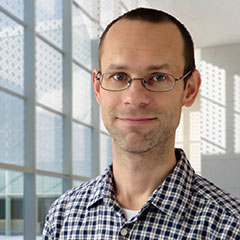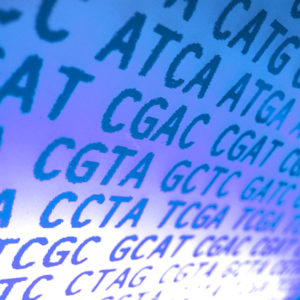Next Generation Sequencing Bioinformatics (Virtual)
19–23 October 2020
Virtual course
Essential informatics skills and knowledge to begin analysing next generation sequencing data
Summary
Due to the ongoing situation with Covid-19, this course will be delivered in a virtual format.
Next generation sequencing has become an essential tool in genetic and genomic analysis. It is increasingly important for experimental scientists to gain the bioinformatics skills required to assess and analyse the large volumes of sequencing data produced by next generation sequencers.
This next generation sequencing bioinformatics course aims to equip participants with the essential informatics skills and knowledge required to begin analysing next generation sequencing data and carry out some of the most common types of analysis.
The programme will cover the algorithmic theory and principles of bioinformatics, with a strong focus on practical computational sessions using sequence analysis techniques and tools applicable to any species or genome size. Accompanying the lecture and practical sessions will be a series of seminars by invited speakers, who will highlight their ground-breaking work in applications of next generation sequencing.
Please note: The practical sessions will be taught exclusively through Unix/Linux. Therefore, participants are required to have some previous exposure of using the Linux operating system. This will be essential for participants to fully benefit from the course.
There are numerous online introductory tutorials to the UNIX/Linux operating system and command line, including:
http://www.ee.surrey.ac.uk/Teaching/Unix
http://swcarpentry.github.io/shell-novice/
The course aims to provide a hands-on introduction to bioinformatics for next generation sequencing, and should not be considered a complete education in the theoretical and mathematical foundations of the topics.
Related courses
Please note that this course is aimed at applicants solely interested in analysis of NGS data. Applicants interested in laboratory-based training in NGS technologies and methodologies should consider our Next Generation Sequencing lab course. Email us to be kept updated on the 2021 NGS lab course.
Programme
For this virtual course, we plan to use a combination of video conferencing, streaming, and online and virtual machine (VM) teaching resources to deliver the different elements of the course as interactively as possible.
The course will run approximately 10:00-17:00 (GMT+1) daily. Some teaching materials may be pre-recorded but participants must be available to attend live, interactive sessions online between these times.
The hands-on programme will cover several aspects of next generation sequencing data analysis, including lectures, discussions and practical computational sessions covering the following:
- Introduction to NGS technologies
- Introduction to the unix command line
- Advanced unix
- NGS data formats and tools
- Sequence alignment+QC
- SNP/indel theory and practical
- Structural variation theory and practical
- RNA-seq analysis
- ChiP-seq analysis
- Sequencing data visualisation with the Integrated Genomics Viewer (IGV)
- Accessing public sequencing repositories
Please note: The practical sessions will be taught exclusively through Unix/Linux. Therefore, participants are required to have some previous exposure of using the Linux operating system. This will be essential for participants to fully benefit from the course.
There are numerous online introductory tutorials to the UNIX/Linux operating system and command line, including:
http://www.ee.surrey.ac.uk/Teaching/Unix
http://swcarpentry.github.io/shell-novice/
Learning Outcomes
On completion of the course, participants can expect to have acquired:
- A working knowledge of the unix command-line and advanced unix commands for automating bioinformatics tasks
- Knowledge of how to do QC assessment of high throughput sequencing data
- Understanding of the algorithmic concepts behind short read alignment and variant calling, and practical experience using the software
- Experience analysing RNA-Seq and CHiP-seq data for measuring abundance
- Knowledge of the organisation and sequencing data types available in public sequencing repositories
Instructors and speakers
Course instructors

Jacqueline Keane
Wellcome Sanger Institute, UK

Thomas Keane
EMBL-EBI, UK

Petr Daněček
Wellcome Sanger Institute, UK
Victoria Offoed
Wellcome Sanger Institute, UK

Shane McCarthy
Wellcome Sanger Institute, UK

Michael Quail
Wellcome Sanger Institute, UK

Vivek Iyer
Wellcome Sanger Institute, UK
Guest speakers
The course will feature instructor talks and research seminars from distinguished guest speakers. Guest speakers will be announced shortly.
How to apply
Prerequisites
Applicants should be postdoctoral scientists, senior PhD students, junior faculty members or clinicians/healthcare professionals actively engaged in or soon to commence research involving next generation sequencing data analysis.
Due to the course typically receiving a large number of applications, priority will be given to applicants:
- that currently have or will very soon have NGS experimental data to analyse
- whose experiments will utilise the bioinformatics techniques taught in at least two of the modules/topic areas listed in the programme outline
- who have a clear plan/opportunity to disseminate the knowledge amongst their peers.
We encourage applicants to highlight these areas in their application.
Please note that due to the virtual format for this course, participants will require minimum computer specifications and internet access to fully benefit.
A guide to these requirements can be found here (PDF).
How to Apply
Please click the Apply button above to begin the online application process. Places are limited and will be awarded on merit. If you have any problems with the online application process, please contact us.
Please note: Applications must be supported by a recommendation from a scientific or clinical sponsor (e.g. supervisor, line manager or head of department). A request for a supporting statement will be sent to your nominated sponsor automatically during the application process. Applicants must ensure that their sponsor provides this supporting statement by the application deadline. Applications without a supporting statement cannot be considered.
Cost
| Cost | ||
| *Course fee | £250 | Due to the ongoing situation with Covid-19, this course will be delivered in a virtual format. |
*The course fee is subsidised by Wellcome Genome Campus Advanced Courses and Scientific Conferences and applies to non-commercial applicants. Please contact us for the commercial fee.
Bursaries
Limited bursaries are available (up to 50% reduction on the course fee) and are awarded on merit. If you would like to apply for a bursary, please complete the bursary section of the online application form.
Where there are many bursary applications, the selection committee may issue smaller amounts.
Bursaries can be applied for as part of the course application form. Applicants will be notified of a bursary award along with their place on the course, usually within one month of the application deadline. The decision of the selection committee is final.
Please note that both the applicant and sponsor are required to provide a justification for the bursary as part of the application.
Additional funding opportunities
Visit our support page for additional financial support currently available.
Accommodation services phishing scam – please be vigilant. More information.
Testimonials
Feedback from the 2019 course:
“I am impressed with all the knowledge that I got in a few days not only from the instructors but also from the other participants. It was my pleasure to learn from an experienced, knowledgeable and recognized international experts group in sequencing and bioinformatics.”
“Fantastic course. Great instructors”
“I think the course was really great. The instructors were very friendly and have really helped us throughout the practical sessions. I found the course really informative and useful in terms of the command line and how to use bioinformatics tools to analyse my data. Overall, it was a superb experience and foundation for my future work with NGS bioinformatics.”
“Thank you for this very well organized course! There was a nice balance between theoretical and practical sessions in all the modules. The instructors were all very nice and helped whenever they could. I will definitely recommend this course to my colleagues.”
“Overall an excellent and highly beneficial course, well developed and well run. The success of this course is undoubtedly due to the instructors who were truly well suited to delivering this program.”

